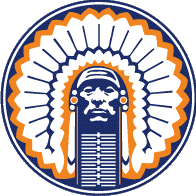
From The Chicago Tribune…
---------------------------------------
Illiniwek: Symbol or mascot?
By Jodi S. Cohen, the Tribune's higher education reporter
It’s common knowledge that Chief Illiniwek, the mascot of the University of Illinois at Urbana-Champaign, is controversial.
But until last week, I didn’t realize that the sentence above also would be controversial.
Those who support Chief Illiniwek--the barefoot student who performs in a buckskin costume and feather headdress during halftime--believe that calling him a mascot reveals an anti-chief bias.
They were quick to tell me that I had made a mascot misstep in stories reporting that the Oglala Sioux tribe wants the university to return the regalia used by Chief Illiniwek.
The chief’s supporters prefer the term “symbol” and say that “mascot” has become the politically correct word used by critics who believe the chief is a politically incorrect representation of Native Americans. They say the anti-chief camp uses the word “mascot” to make it sound as if the chief is demeaning to Native Americans.
What chief supporters don’t seem to realize is that their choice of the word “symbol” is just as political as “mascot.” They think “symbol” makes the chief sound more dignified and better describes their view that the chief is a respectful tribute to the native people of Illinois.
Framing language to advance a particular agenda is not new. The American Civil War was called by some the War Between the States, the War of Northern Aggression and the War of the Rebellion, said lexicographer Erin McKean, editor of Chicago-based Verbatim magazine.
The current Iraq war has its own politically charged vocabulary. The proposed troop increase has been variously called a surge, an escalation and an augmentation, for example.
“Anyone strongly for or against a particular position will use any means necessary rhetorically to strengthen their position,” said McKean, who also is editor-in-chief of The New Oxford American Dictionary. “If saying ‘symbol’ instead of ‘mascot’ convinces someone that Chief Illiniwek is a dignified representative of the earlier peoples of Illinois, that is what they want to do.”
According to Merriam-Webster’s Collegiate Dictionary, a mascot is “a person, animal, or object adopted by a group as a symbolic figure, especially to bring them good luck.” The word has French origins that can be traced to an 1880 operetta called “La Mascotte.”
To be sure, a dictionary definition or expert linguists won’t solve the yearslong battle over the chief and the language to describe him.
[Click on the essay title above to read the full story.]

No comments:
Post a Comment